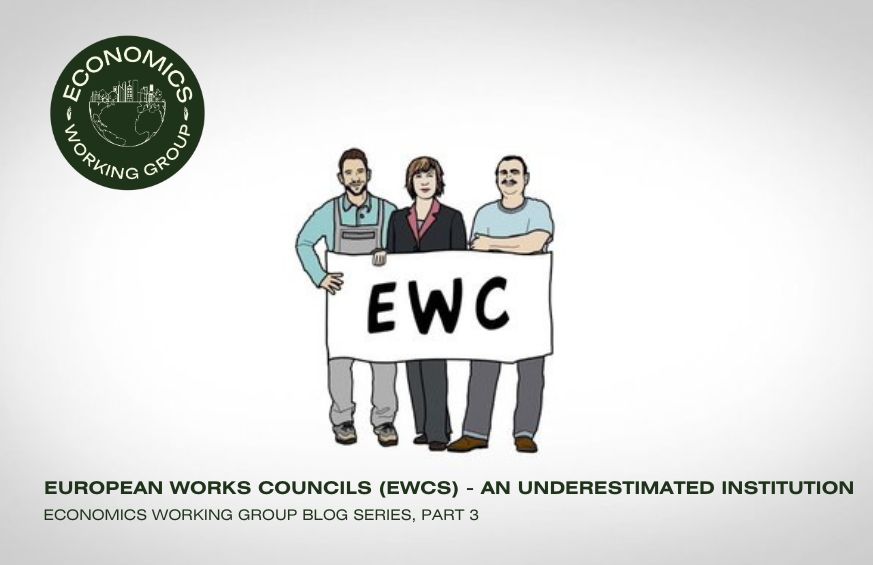The 2024 European Parliament elections are increasingly contingent on the rise of the radical right in Europe. In response to this threat, Heinz Bierbaum highlights an important tool of left politics. He discusses the role of “European Works Councils”, and shows why they are important for a left strategy.
This article is part of transform!’s Economics Working Group Blog Series.
(Introduction by Roland Kulke)
It is odd that when we see discussions and debate over left-wing European politics and hear, for example, calls for socio-ecological transformation and the development of a European industrial policy from the left, European Works Councils (EWCs) are hardly ever mentioned. Yet EWCs are the only workplace-based trade union institutions that operate at the European level. This lack of attention is in part because the firm or company level often plays a subordinate role in debates on the structure and orientation of European industrial policy.
The establishment of a European Works Councils in companies and corporations that have at least 1,000 employees in the EU and at least 150 in each of two countries has been possible since 1994. These councils have information-access and consultation rights with regard to transnational issues, however provisions are not made for co-determination. This means for example that companies must report on the economic situation of the firm and its potential consequences for workers. This is the basis for consultation, i.e. the provision of information to the council’s representatives. “Consultation” has remained undefined for EWCs and is often limited to mere formal consultation. While in practice experiences have varied, the general criticism is that there is usually no meaningful consultation. Often even accessing the information necessary for the EWC to generate its own opinion is insufficient. The information provided by the company is not always comprehensive enough and usually comes too late, often only at the actual EWC meeting itself. Even when information is finally given to the workers’ representatives, it is often only provided in verbal and not written form. These deficiencies were inherent in the original directive governing EWCs and had a considerable negative impact in practice, leading the directive to be amended in 2009. A second amendment to improve the legal-basis and rights of EWCs is currently pending after an evaluation identified clear deficits in EWCs. Trade unions have continually called for significant improvements in EWC rights. This includes the way in which information is provided, which should be timely, comprehensive and, above all, in writing. Similarly, consultation rights should be clarified so that the EWC can have real influence in company decisions.
However, it is not always the just deficiencies in the Directive governing EWCs and its transposition into national legislation that affect the operation and impact of the councils. In many cases the rights that do exist under the current legislation are not harnessed to their full potential. This can be because of a lack of trade union awareness among members of European Works Councils. This is particularly the case when the relevant trade unions do not participate in shaping the composition of the EWC and leave it to the company’s HR department of the – which is not uncommon. Problems also arise from the fact that despite the initial high level of commitment to the idea, trade unions have tended to neglect the European Works Councils. Of course, there are exceptions. One notable case is the Comisiones Obreras (Workers’ Commissions) in Catalonia, which regularly discusses the orientation, strategy and practice of EWCs.
We can also look towards numerous examples where the actions of a European Works Council clearly went above and beyond the minimum standards of the Directive and became an effective instrument for the representation of European interests. Most often this has meant EWCs which fight for an open and transparent policy of information-sharing. Information on the current situation of the company, along with any intended changes in strategy and the impact these changes may have on employees must be provided in writing and in sufficient time to enable the EWC to form an opinion of its own with the help of its own experts, which it is within its rights to demand. Transparent and timely access to this kind of information is a precondition for meaningful consultation. Experience has shown us that when this consultation takes place it is possible to enact changes in company policy in the interests of the employees. A successful example is the European Works Council of Alstom, a French company active in the rail transportation, vehicle, and energy sectors. Since the foundation of the EWC at Alstom, the corporations energy division was sold to General Electric. Despite this, over time the EWC was very active and successfully improved its influence, holding several meetings a year and setting up working groups on specific issues. The groundwork for serious consultation was created through improved access to information. When the company eventually began the transnational restructuring processes the EWC was consulted first, even before changes began nationally. Faced with the eventual split-up of the corporation resulting from the selloffs to General Electric, and even through the period of plant closures in the energy sector under the direction of General Electric which could ultimately not be prevented, the work of the Alstom EWC is an example of successful EWC influence.
European Works Councils facilitate the transnational exchange of experience and ideas between employee representatives. They work towards a common regulation of working conditions. Their usefulness is particularly apparent in the context of multinational restructuring processes. Companies often promote the idea of “Corporate Social Responsibility” and it is here that EWCs can play an important connecting role. There have been examples of restructuring processes which result in successful, socially just outcomes. It is possible for changes to take place in which the workforces are not pitted against each other, and where compromises are reached between the various locations in order to reserve jobs. What is still necessary, however, is a stronger connection to trade unions. To strengthen this, European trade unions such as IndustriAll have designated coordinators for the European Works Councils. The European Works Councils should be deeply involved in the transformation processes currently underway to make ecological production possible. EWCs and the workers they represent can influence the company’s policies in a more socially just and sustainable direction if they are focused on this goal and exert the rights they are entitled to.
Socio-ecological transformation is a core issue for the Left in the European Parliament and also for the Party of the European Left (EL). The reorientation of corporate policy towards sustainability is a crucial step in bringing about successful social and ecological transformation, yet still too little attention is paid to the firm-level. It must be a priority of the European Left to help ensure a solid legal footing for European Works councils in order to facilitate their activity in this direction.
This article is part of transform!’s Economics Working Group Blog Series.



